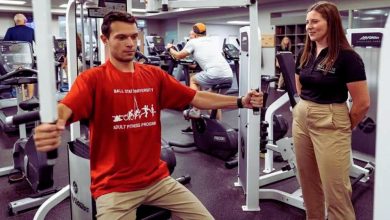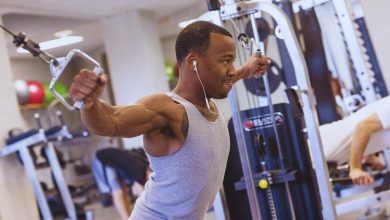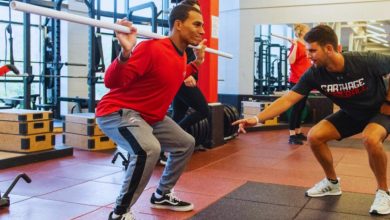The Benefits of Earning an Exercise Science Degree

Introduction: The advantages of a degree in exercise science
Obtaining an exercise science degree can present a universe of fascinating prospects! More individuals than ever before are emphasizing health and fitness, hence, this industry is expanding. Examining the numerous features of this flexible and fulfilling profession, let’s go deeply into why earning an exercise science degree could be a wise career path for you.
First of all, an exercise science degree covers all aspects of our body’s functioning during motion. It resembles working as a body detective! You’ll discover muscles, bones, and how our hearts pump during activity. This knowledge explores the complex processes allowing human mobility, transcending simple knowledge of basic anatomy. You will have a thorough awareness of the human body in motion, from learning about the energy systems running our activities to investigating the biomechanics of difficult movements.

This degree’s great advantage is its great flexibility.
You might work in a hospital, a gym, or even among professional players! Imagine supporting your preferred sports team through the big game. Alternatively, see yourself assisting someone in walking once more following an injury. With an exercise science degree, these are actual things you could do. The adaptability of this degree helps you to fit several job routes as your interests change with time.
For recent exercise science graduates, the employment market is expanding quickly. More individuals desire to become healthy, hence, they require professionals to guide them. This suggests your chances of landing a job following graduation are high. Studying something in great demand usually sounds great! This development is driven by growing attention to preventative healthcare and growing knowledge of the need for physical exercise, generating new possibilities in both established and innovative sectors.
Another stepping stone towards other professions is an exercise science degree. Many students utilize it to prepare for either medical or physical therapy schools. It provides a solid basis for any task involving body movement and functioning. Your newfound expertise can be used in disciplines including occupational therapy, chiropractic medicine, and even ergonomics in office design.
Studying exercise science is more than just sitting in classes.
You’ll also have hands-on experience. You might find out someone’s fastest running speed or work out the ideal weight-lifting technique. Learning by doing is far more interesting than merely reading books. Many programs allow you to apply your knowledge in practical environments before you ever graduate, using internships or practicum experiences.
This degree can also equip you to enable others to lead better lives.
You will gain knowledge on safe exercising, good food, and injury prevention. These are abilities you can apply outside of your employment to benefit friends and relatives. You will become a great asset to your neighborhood since you can offer wise fitness and wellness recommendations.
Regarding employment, an exercise science degree can open some interesting paths. You might be a personal trainer guiding individuals toward fitness. Alternatively, you can be employed in a hospital tending to injured patients’ recovery. Some graduates even assist space agencies in determining how to keep astronauts healthy in zero gravity! The range of job possibilities is amazing; it will help you identify a niche that exactly fits your interests and aptitudes.
Studying exercise science also helps us to understand how our bodies and brains interact. You’ll learn how exercise could help people think clearly and be happier. This information can help you improve your mental as well as your physical health. Exercise psychology is a developing subject that investigates how physical activity affects mental health, therefore creating job prospects in fields such as stress management and cognitive performance improvement.
If your passion is sports, an exercise science degree is ideal.
You will know why sportsmen train the way they do and how to support their performance improvement. You might even come up with fresh approaches to instruction that nobody else has considered! Jobs in sports performance analysis, athletic training, or even sports equipment design can follow from this degree.
Exercise science goes beyond sprinting or lifting big weights.
It also relates to assisting those with medical issues. Working with heart patients, you could assist with safe exercise. Alternatively, you may assist elderly people in maintaining their strength and independence as they age. From cardiac rehabilitation to the management of chronic diseases like diabetes or obesity, exercise science finds extensive therapeutic use.
Additionally,
this degree employs educational institutions. You might work as a PE instructor, guiding children toward a love of movement. Alternatively, you might teach the next generation of exercise scientists at a college. Promoting lifetime health and fitness depends on education, hence, exercise science graduates are rather important in determining the content of health courses at all levels.
A few recent graduates in exercise science have entered research. They look at fresh approaches to treat ailments or maintain general health. It may be you who finds the next great thing in health or exercise! Research projects span from finding innovative rehabilitation strategies for wounded sportsmen to investigating the molecular impacts of exercise.
Even careers in the corporate sector can result from an exercise science degree. Some graduates land jobs for businesses producing sports gear or exercise equipment. Others enable large corporations to keep their employees content and healthy. Growing fast, the corporate wellness industry is driven by many companies realizing the importance of employee health initiatives in increasing production and lowering healthcare expenses.
Understanding exercise science will equip you to be a health leader in your neighborhood. You will be able to organize exercise regimens or educate others about sensible living. This information can somewhat improve the general state of the planet! You might find yourself planning group exercise programs, planning neighborhood health fairs, or perhaps even guiding local legislators on public health projects.
Exercise science’s technological component is also exploding.
You might focus on creating virtual reality exercise regimens, wearable devices, or fitness applications. Graduates in tech-savvy exercise science are in great demand as technology shapes how people approach fitness.
One fascinating topic you might investigate is environmental exercise physiology. This field studies how human performance is affected by various surroundings, such as high elevations or extreme temperatures. Athletes preparing for events in difficult environments and workers in physically taxing occupations both depend on this information.
Exercise science interacts with nutrition science. You will discover how nutrition and exercise cooperate to improve performance and support general health. This information might inspire professionals in sports nutrition, weight control, or even creating new nutritional supplements for athletes.
Another subject in which exercise science graduates can significantly influence is adaptive physical activity. Working with people with impairments, you could create customized workout plans that enhance their physical capacity and quality of life.

Finally,
an exercise science degree might provide a starting point for entrepreneurship. Many recent graduates open their fitness clubs, produce new fitness products, or launch internet coaching companies. Your combination of scientific knowledge and acquired practical skills prepares you to be creative in the health and fitness sector.
In essence, the conclusion is:
After earning an exercise science degree, one can have a fulfilling and interesting job with many chances. From helping professional athletes to working in hospitals, from creating innovative exercise equipment to influencing public health policy, it opens doors to various employment opportunities. This degree provides you with valuable, in-demand knowledge applicable in many different areas.
Most crucially, perhaps, an exercise science degree enables you to improve people’s quality of life. You will be improving many people’s quality of life, whether you are supporting an athlete in reaching peak performance, helping someone recuperate from an injury, or teaching a community about good living.
Exercise science is a dynamic and always-changing discipline that guarantees your education won’t stop with graduation. Constantly evolving new research, technologies, and methods of health and fitness offer countless chances for development and specialization all around your career.
An exercise science degree could be the ideal basis for your future, whether your interests are at the junction of health and technology, driven to help others, fascinated by the human body, or sports. This area blends research, pragmatism, and the great gratification of seeing others meet their fitness and health goals.
So why not try it?
The varied and fascinating field of exercise science may be your ideal career route. Recall that every path towards improved health begins with one step; so, your degree in exercise science could be that vital first step toward a successful profession and a better world.
FAQ:
1. Does earning an exercise science degree require me to be exceptionally athletic?
Not so sure. You simply have to find great fascination in the mechanics of bodies. Though it’s not necessary, being fit can assist. Understanding the science takes the front stage here, not individual athletic ability.
2. With an exercise science degree, might I be a doctor?
Although many doctors begin with degrees in exercise science, you would still have to attend medical school after. It offers a first-rate basis for more medical education.
3. Does exercise science involve much arithmetic?
Though largely related to real-life scenarios, there is some arithmetic involved. You’ll apply arithmetic for tasks such as as movement data analysis or energy expenditure computation.
Given an exercise science degree, may I work overseas?
Indeed! Everywhere is health and fitness, thus, your talents will help you everywhere. Many graduates find work in multinational sports teams or worldwide health campaigns.
5. How long does one have to work toward an exercise science degree?
Usually, it takes four years for a bachelor’s degree, however, associate programs run for two years as well. Several colleges provide combined bachelor’s/master’s degrees or accelerated programs.
Six. Is physical education the same as exercise science?
Though exercise science probes further into the science underlying movement and health, they are related. It covers a closer examination of physiology, biomechanics, and research techniques.
7. Could I launch my own company armed with an exercise science degree?
Sure! Many recent graduates have launched gyms, wellness centers, or online coaching companies. In the fitness business, your scientific background will help you stand out.
8. In an exercise science program, will I study nutrition?
Since diet and exercise are intimately related, most programs include some nutrition lessons. Several programs include minors in nutrition science or specializations in nutrition science.
9. Are exercise science degree programs available online?
Indeed, many colleges have online or hybrid courses, but practical experience is still quite valuable. Search for initiatives involving internships or practical components.
10. Can I focus on one area of exercise science?
Specialties such as as sports performance, clinical exercise, biomechanics, or exercise physiology abound in many programs. Certain colleges let you design your emphasis area as well.
11. Do positions in exercise science pay well?
Pay varies depending on the work, but many in this field pay attractive rates—especially as you get experience. Higher-income potential frequently comes from specialized professions or those needing advanced degrees.
If I have an exercise science degree, can I work with children?
Most definitely! Many graduates teach PE, child sports, or pediatric fitness. Fighting childhood obesity is becoming more and more important, hence, this field of work has possibilities.
13. Does enrolling in an exercise science program prove difficult?
While requirements differ depending on the institution, most search for students who are very interested in science and health. Good marks in arithmetic, chemistry, and biology will assist.
14. With an exercise science degree, is research possible?
Indeed. Many recent graduates pursue research on subjects like innovative fitness approaches or injury prevention. Research prospects abound in colleges, hospitals, and businesses.
15. Would a degree in exercise science help me to design exercise programs?
Indeed, most exercise science courses heavily rely on the creation of safe and successful exercise regimens. You’ll pick skills in customizing programs to match various groups and fitness objectives.
Related Tag:
exercise science degree, exercise science helps, exercise science program



